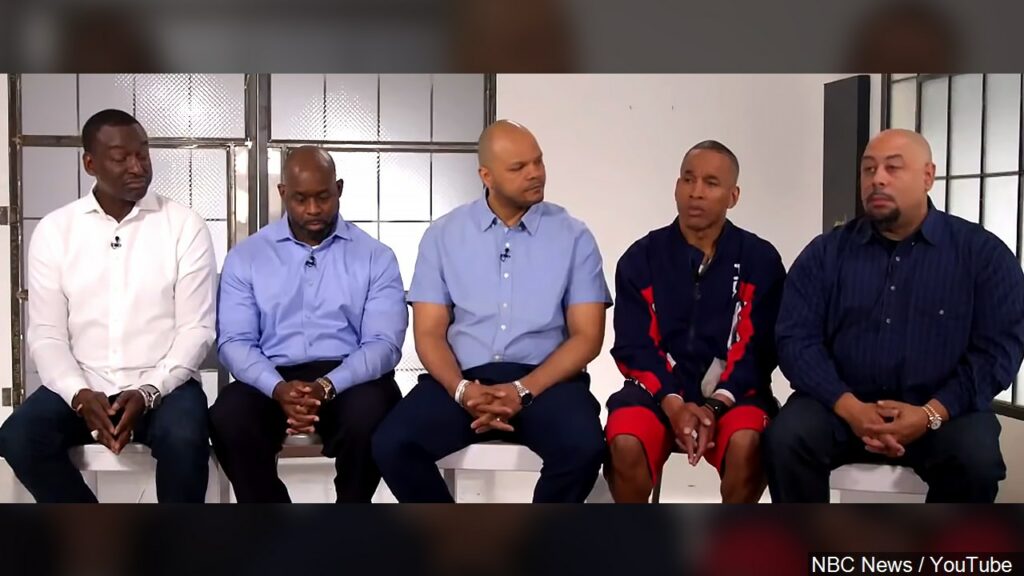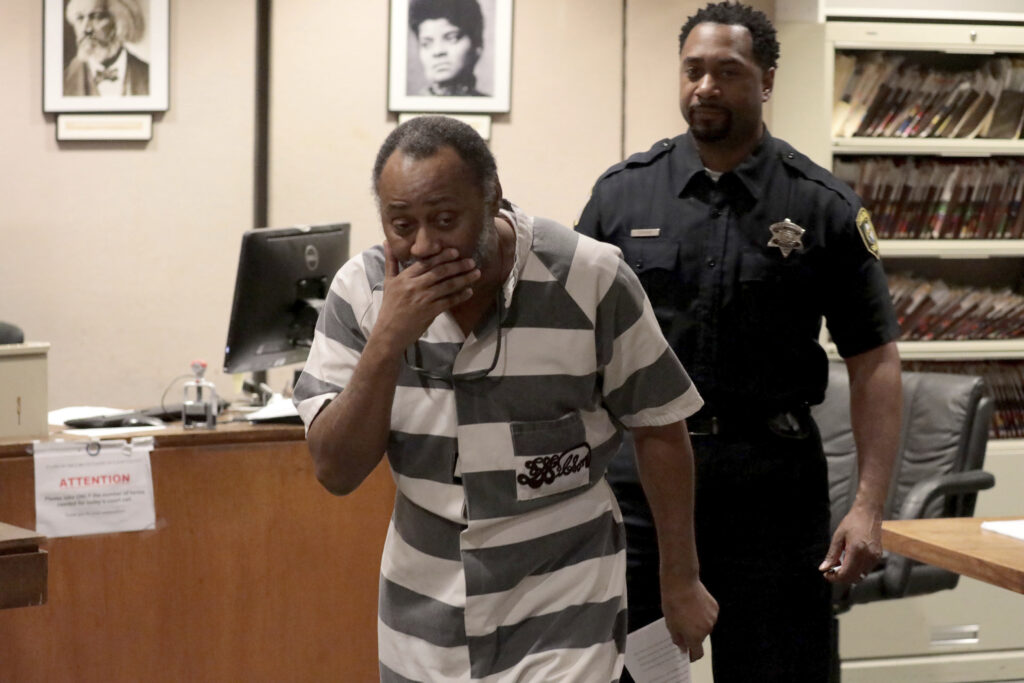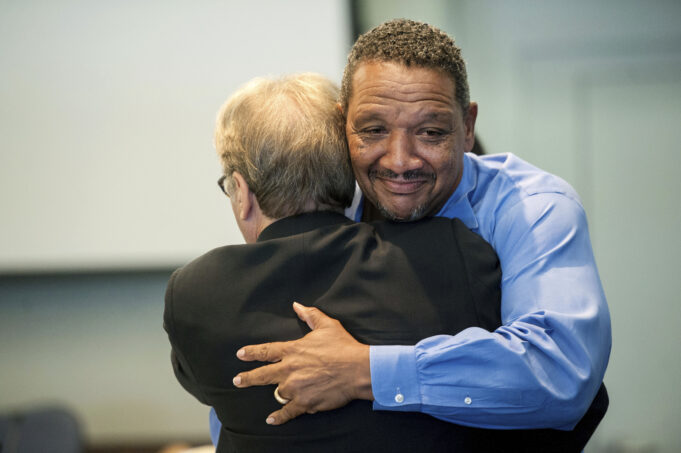Darryl Howard, who is Black, spent over 21 years of his life in prison serving an 80-year sentence for a crime he did not commit.
He was a victim of lies told by retired Durham, N.C., detective Darrell Dowdy, the detective’s fabrication of evidence and a bad faith failure to investigate, according to findings by a federal jury. Mr. Howard was convicted of two counts of second-degree murder and one count of arson.
The murder convictions were overturned, and Mr. Howard was exonerated in 2016. In 2021, he received a pardon from North Carolina Governor Roy Cooper. He also filed a lawsuit for $6 million and won.
But he hasn’t seen a penny.
In closed sessions that lasted from December 2021 to February 2022, city officials decided they would not be paying the award, after spending $4 million defending Mr. Dowdy, a Black detective who served the city for over 30 years.
In 1995, Mr. Howard was convicted for the 1991 murders of Doris Washington, 29, and her 13-year-old daughter Nishonda, both of whom were found dead in their apartment after being sexually assaulted and set on fire. New DNA evidence proved he did not commit the crime.
The lawsuit was originally filed against the city of Durham, Mr. Dowdy and other individual defendants. The city was dismissed as a defendant due to the judge’s ruling that there was not enough evidence to claim the city was directly responsible, stated Nick Brustin, one of Mr. Howard’s lawyers, to The Final Call. The only defendant at trial was Mr. Dowdy, he said.
“We’re going to appeal that. But the city of Durham, like all cities, typically indemnify (secure against loss) police officers when they’re found liable for misconduct. It happens all the time, including in Durham,” he stated.
City Attorney Kimberly Rehberg said in a statement that the jury’s decision is about Mr. Dowdy, not the city. “Initially the city and other employees were named in the lawsuit,” she said. “But those claims were dismissed or dropped by the time the case made it to trial.”

Mr. Dowdy made $76,000 a year before he retired, according to his lawyer, Patricia Shields, who stated he did not have $6 million to give.
Mr. Howard originally sought $48 million: $2 million for each year he was incarcerated and $5 million for the impact of imprisonment. Kathy Greggs, co-founder and president of the Fayetteville Police Accountability Community Task Force, believes he should have been awarded the full compensation.
“If we had constitutional law that is supposed to be practiced and not get violated at a criminal trial, Darryl would have never had to be in there that many years to even ask for compensation,” she said. “And why should it even be a discussion of how much money he should get?”
Durham has a majority Black city council, with a Black mayor and a Black city attorney. But “just because you look like us, don’t mean you’re for us,” expressed Ms. Greggs. “We need to make sure that before we vote someone in or re-elect them as the D.A., in Durham, the mayor or anyone else when it comes to Darryl Howard’s case, we don’t need to really re-elect you if you’re not doing the right thing for the people, especially your own people.”
She questioned: Why don’t we have a Black governance committee that will do the right thing by Black people?
“We rely only on the Black leaders that are in these positions, and that’s all we got. And we can’t even rely on them right now, 2022. Over 500 years of slavery and we still can’t rely on our own people,” she said. “Where’s the uproar in this? Why isn’t nobody protesting this? Where’s the people at stating that he deserves this compensation?”
Nation of Islam Student Minister Amon Muhammad of Durham described the city’s refusal to pay as “disappointing.” He said he believes the decision will be a blemish on the city’s Black leadership.
“We expect for Black leadership to rise to the occasion when the traditional White supremacist judicial system routinely finds some legal loophole, if you will, to deny someone what they’re justly due,” he said.
He was surprised about the council’s decision, as he considers two of the councilmembers his friends.
“There has to be something that we don’t know that happened maybe in that closed session that made them gamble that this was the right decision for them to make, but from my perspective, no. No, it’s not justifiable,” he said.
In most cases, payouts by the city are covered by insurance policies or budgeted funds paid by taxpayers.
“This money, the $6 million, is really from citizens that have to pay because of police misconduct, because of wrongful arrest, wrongful convictions,” Ms. Greggs said.
State compensation laws
Mr. Howard’s story represents the continuous fight exonerees go through to obtain a measure of justice, accountability and compensation for their wrongful convictions. Mr. Howard’s fight is with the city. Others fight the state.
Ricky Kidd was wrongfully convicted for 23 years and three months in Missouri and was exonerated Aug. 15, 2019. Issues in his case included police misconduct and prosecutorial misconduct, where the prosecutor withheld key evidence. He is now a justice advocate, a speaker and author. He founded the organization Resilience Mode, a criminal justice consulting platform, and works with the Midwest Innocence Project.
When he was released from prison, he suffered from survivor’s guilt, knowing that other innocent people he knew were still incarcerated. He also had nightmares of being back in prison. Despite his trauma, he has not been compensated.

None of the compensation bills in the state of Missouri are fair, he said to The Final Call.
The federal government, the District of Columbia and 38 states have compensation statutes of some form, according to the Innocence Project. But compensation laws within those states vary, and many states offer a measly number compared to the many years, sometimes decades, the wrongfully convicted spend behind bars. Twelve states do not have compensation laws.
When Mr. Kidd returned home from prison, he came home emptyhanded. He had to rely on support from friends and family because a person who gets exonerated in Missouri is not entitled to any automatic compensation.
“I don’t even think financially, no dollar amount they can give actually rights the wrong, but it gives a person an opportunity to restart and get back on with their life,” he said. “We don’t come home with any 401(k)s. We don’t come home with any housing. We don’t own any assets. We don’t have access to mental health care, physical health care. So all those things that compensation will help do, the state of Missouri does not offer.”
His only option was to sue.
“We’re forced to sue, and then you have to find somebody to sue, whether that’s the public defender system, whether that’s the Kansas City Police Department, whether that’s the prosecutor’s office,” he said. “And even when you lay your eyes on who you might think you want to sue, it’s not as cut and dry. There are laws that are in place that protect police departments and prosecutors.”
Mr. Kidd’s lawsuit is still pending. He said he is attempting to show that the police department knew they were sending the wrong person to prison. He noted that his lawyers have to successfully prove what the lawsuit is alleging and that there is still a long journey ahead.
According to a 2019 report by Jeffrey S. Gutman, professor of clinical law at the George Washington University Law School, and Lingxiao Sun, a then master’s student in the Department of Statistics at George Washington University, since 1989, states have paid $545 million to wrongful conviction compensation pursuants, which amounts to an average of less than $20 million annually.
Many states cap the amount of money exonerees can be compensated. For example, Ronnie Long, another Black man in North Carolina, was wrongfully convicted for 44 years and was awarded $50,000 for every year he was convicted, up to $750,000, the state’s cap. The compensation makes up 15 of the years he was incarcerated for with a remainder of 29 years.
The average annual amount paid to exonerees is just over $70,000 due to states such as Connecticut and New York that do not cap damages, the report stated. It further stated that nearly half of the years lost by exonerees convicted in states with compensation statutes were uncompensated.
The report found that almost 45 percent of the exonerees filed lawsuits on the federal or state level, but only 55 percent of those who filed received some monetary recovery.
Since 1989, exonerees recovered over $1.7 billion as a result of verdicts or settlements in civil compensation suits, which amounts to an average of just under $305,000 a year, the report states. Furthermore, exonerees were compensated in civil compensation suits for only 32 percent of the total years lost.
The report’s analysis was based on a data set of 2,000 people recorded by the National Registry of Exonerations between January 1, 1989 and May 3, 2017.
Unfairness in compensation
To date, the National Registry of Exonerations has recorded more than 3,000 people who have been wrongfully convicted and exonerated. About 50 percent of exonerees are Black, and Black people are seven times more likely to be wrongfully convicted of murder than White people, according to a 2017 report by the registry on race and wrongful convictions.
“That speaks to the idea that we are a targeted group,” Mr. Kidd said.
He listed two main reasons Black people are targets: one, because Black people may not have access to money due to growing up in underserved communities; and two, because the idea all along, dating back to the 13th Amendment, was to “recapture the slaves.”
Mr. Kidd expressed that he doesn’t think society takes wrongful convictions as seriously as it should, in general, and that there has to be a public outcry in order for the behavior to stop.
“You send an innocent person to prison saying he or she is guilty. They are proven innocent. So then who does that make guilty? That makes the state guilty. And the state does not want to acknowledge guilt,” he said. “ ‘No, I’m not acknowledging guilt. No, I’m not acknowledging that we did anything wrong. And so no, I’m not paying you one red dime. Or I’m gonna find ways to not pay you money. Even when you win, I’m gonna find ways to not pay you money.’ ”
But even when someone is awarded $100 million, the truth of the matter is, Mr. Kidd said, “there are certain things that money can’t buy” or take away, such as the trauma and the deaths of family members while behind bars. Even so, there is an idea of what fair compensation should look like, and he said he hasn’t seen a fair compensation bill in any state.
In some cases, people who are wrongfully convicted are forced to choose between freedom and restitution through offers that guarantee freedom at the cost of disallowing the wrongfully convicted person to sue or seek compensation.
Mr. Kidd illustrated the internal dilemma when deals like that arise: “At that stage 25, 26 years, that means I’ve lost a dozen or more times. I lost 11 times before I finally won my very last appeal. And so you get to that stage and you’re thinking, do I want to try to go through the courts and maybe win and maybe lose? … Or do I take this bull crap deal, sign 25 years, I’m free. But I have no way to hold them financially accountable now.”
The fight for fair compensation
Mr. Kidd suggested that to ensure fair compensation, the federal government could make it mandatory that a certain dollar amount must be given, and if independent states want to qualify for federal grants and funding, they must follow the recommended mandates.
Several bills are being proposed on the state level. In North Carolina, advocates are pushing for a citizens’ review board with a civilian police oversight authority that would review police misconduct and review evidence. Another bill would allow exonerees to seek relief from the court rather than the governor, as exonerees in North Carolina must first get a pardon before being eligible for compensation, as Mr. Howard did.
“Darryl has been through hell,” attorney Nick Brustin said. “And he is a person who, despite all of it, has shown incredible resilience and grace.”
He said Mr. Howard has come to expect nothing and just wants to move on with his life and enjoy the time he has left with his family.
Mr. Brustin explained that they have no choice but to go after Mr. Dowdy’s individual assets, to at least partially collect, as they continue to do everything in their power to collect from the city.
“We proved the detective in this case did very bad things. But he was also one of the few longstanding Black detectives in the department,” the lawyer noted. “And so it’s also interesting that the first time they’ve decided not to indemnify an officer, it’s a longstanding Black detective, and the police union should be up in arms about it. The community should be up in arms about it. This is wrong from every direction. It’s wrong. It’s wrong from Darryl’s direction. It’s wrong from Darrell Dowdy’s direction. It’s wrong in every way.”













